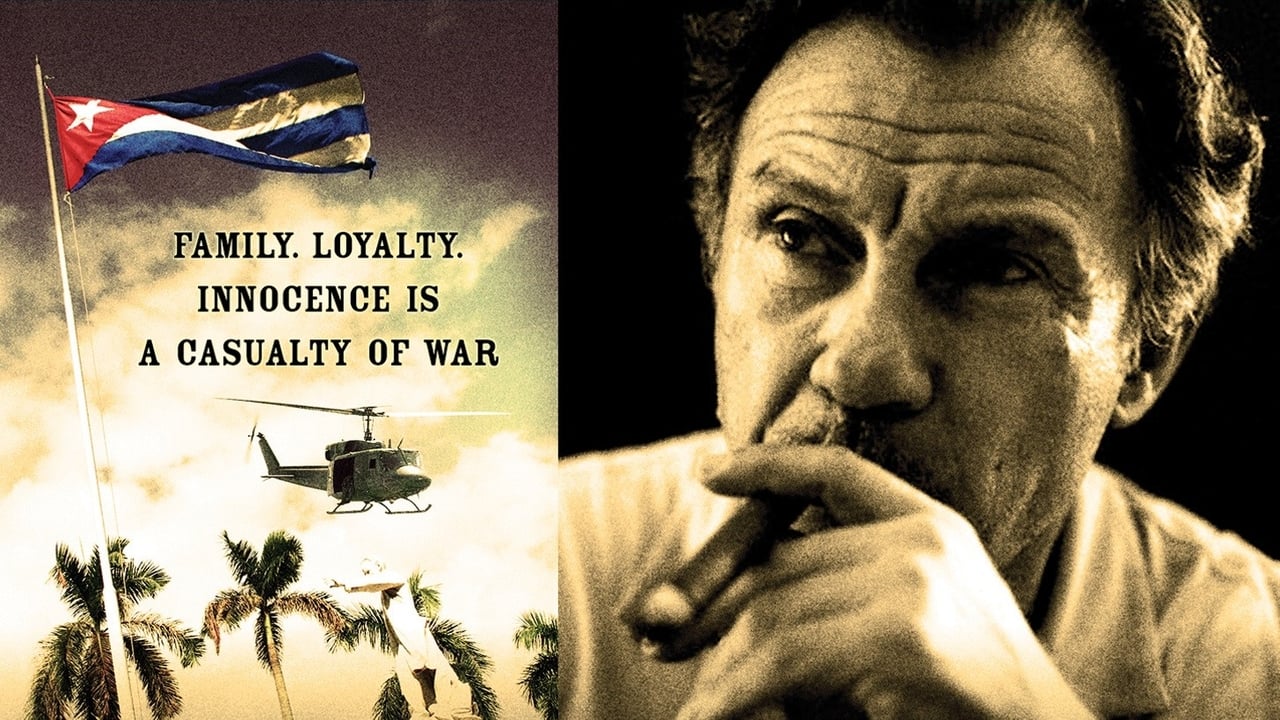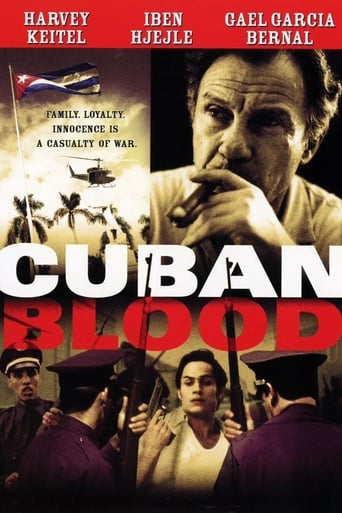

CUBAN BLOOD, a direct to DVD little film, has a long history. Shot in the year 2000 in the Dominican Republic as the first film for director/writer Juan Gerard (with writing assistance from Letvia Arza-Goderich) the film began as a 3 1/2 epic about the small town of Holguín, Cuba in the year 1958, a place where the Bautista/Castro clash was not as evident as in Havana. Originally named DREAMING OF JULIA (referencing both the sole entertainment for the little town - a movie house - as well as the sole Americana Julia who plays a significant pivotal role in the story), the film was next called CUBA LIBRE and finally titled (rather inappropriately CUBAN BLOOD. Juan Gerard has yet to make another film and one can understand why.Holguín is a pretty, peaceful town whose patriarch is Che (Harvey Keitel - and the Che is an old grandfather, not the revolutionary), married to Beta (the very talented and dignified Mexican actress Diana Bracho), who are the beloved grandparents of the little boy (Andhy Méndez) whose story this film is as narrated by off screen mature Tony Planas. The impending revolution results in a loss of power for the town and the story is a simple coming to grips with the changes that are to be inevitable. The boy meets the Americana Julia (Iben Hjejle) who befriends him; he struggles with the town youths who mimic him as a chicken; he dotes on movies he watches with his grandmother Beta; he falls in love with the older Carmen (Farah Alfonseca) who in turn is in love with a quiet revolutionary sympathizer Ricky (Gael García Bernal in his second film after his debut in AMORES PERROS); he learns of Che's infidelity to Beta; and he watches the town and his family disperse with the coming of Fidel Castro's revolution. Seeing the events of 1958 through the eyes of a child is enchanting and for the most part makes for a sweet, though saccharine, film.Cinematographer Kramer Morgenthau takes terrific advantage of the 'year without electricity' motif and makes most of the film shot at night with candles and lanterns creating a storybook loveliness that heightens the romantic aspect of this film. Perhaps in the original 3 1/2 hour version there were better character developments - especially in the case of Gael García Bernal's very small but pivotal role, and in the use of Georg Stanford Brown as a Greek Chorus 'Black Bum' who seems to be placed to make the events unfold with some sense of order.The supporting cast includes some strong actors: Gabino Diego, Cecilia Suárez, Aline Küppenheim, Daniel Lugo, etc whose roles were no doubt better fleshed out in the original. But it is clearly the influence of Harvey Keitel that helped Juan Gerard make this film happen. It has moments but it too often falls into the novella melodrama realm to make it work for audiences trying to figure out whether this is an historic drama or a Cuban version of 'Cinema Paradiso'-type Italian films. Grady Harp
... View MoreDreaming of Julia was the title of the original script, and was filmed in the summer of 2000 in Santo Domingo Republica Dominicana. To release the picture they change the original name to Cuba Libre. The director's cut was 3 and a half hours long. It was released on the festival of Bangkok in Thailand. It was the second film of Gael García Bernal (the first was Amores Perros)and the first of Juan Gerard as a Director. In the poster the names of Diana Bracho and Cecilia Suares does not appear. Diana plays the grandmother and Cecilia the mother of the kid. They are great actresses and they keep the story together specially Diana. Check her out in other things you would be surprised.
... View MoreSaw this at the Hawaii Film Festival where the director and his wife (who produced it) took a Q&A afterwards.I found it hard to believe this is a first time director and all kudos to Harvey Keitel for once again taking a risk and going out on a limb for a script he liked.Certainly reminiscent of Cinema Paradiso, it tells the story of the young director on the turning of the revolution in Cuba. However, don't expect this to be a movie about the revolution, it's political stance is wonderfully ambiguous. Many references to the directors obvious love of film history (a great "Bicycle Thief" homage") and some whimsical scenes which work with out being pretentious.Enjoy!
... View MoreI saw this film and heard the writer-director, Juan Gerard, speak at the Santa Barbara Int'l Film Festival.All I knew about it was that it was the story of an 8-year-old boy at the time of the Cuban Revolution in 1958 and how it affects his home and family.Its opening scene will bring to mind "Cinema Paradiso". In fact, the film is filled with references to classic films: The Roulette Wheel (Casablanca), "chicken clucking" (Rebel Without a Cause), references to Bunuel, "Touch of Evil"; you'll find more. The homeless man (Georg Stanford Brown)is a reference to Cuban folklore which often uses a black man as a type of Greek chorus.What this film really is is the culmination of a dream. Gerard's wish to honor his family and medium of film that he has loved all of his life. This is the true story of Juan Gerard and all the people in it are real,as are the events depicted. Gerard is actually an architect and engineer (and passionate film lover) but his dream was to make this movie. He and his wife decided to live that dream and Harvey Keitel became an "angel" who believed in Gerard and agreed to produce and star in it. Keitel holds the screen powerfully as the mysterious and secretive grandfather "Che". Brown and Keitel are the only Americans in the cast. Iben Hjejle (High Fidelity) and Gael Garcia Bernal (Y tu Mama Tambien) offer strong support in key roles. Truthfully, the first half of the film suffers from stiff delivery of lines, and some overracting, but stay with it. The last half is much better as the events of the revolution combine for the bittersweet, and honest climax. It is the first effort of Juan Gerard, but it is honest as he is and his passion and heart really come through,in this sincere first effort. I would definitely see it again, and hope that he continues his film career.
... View More